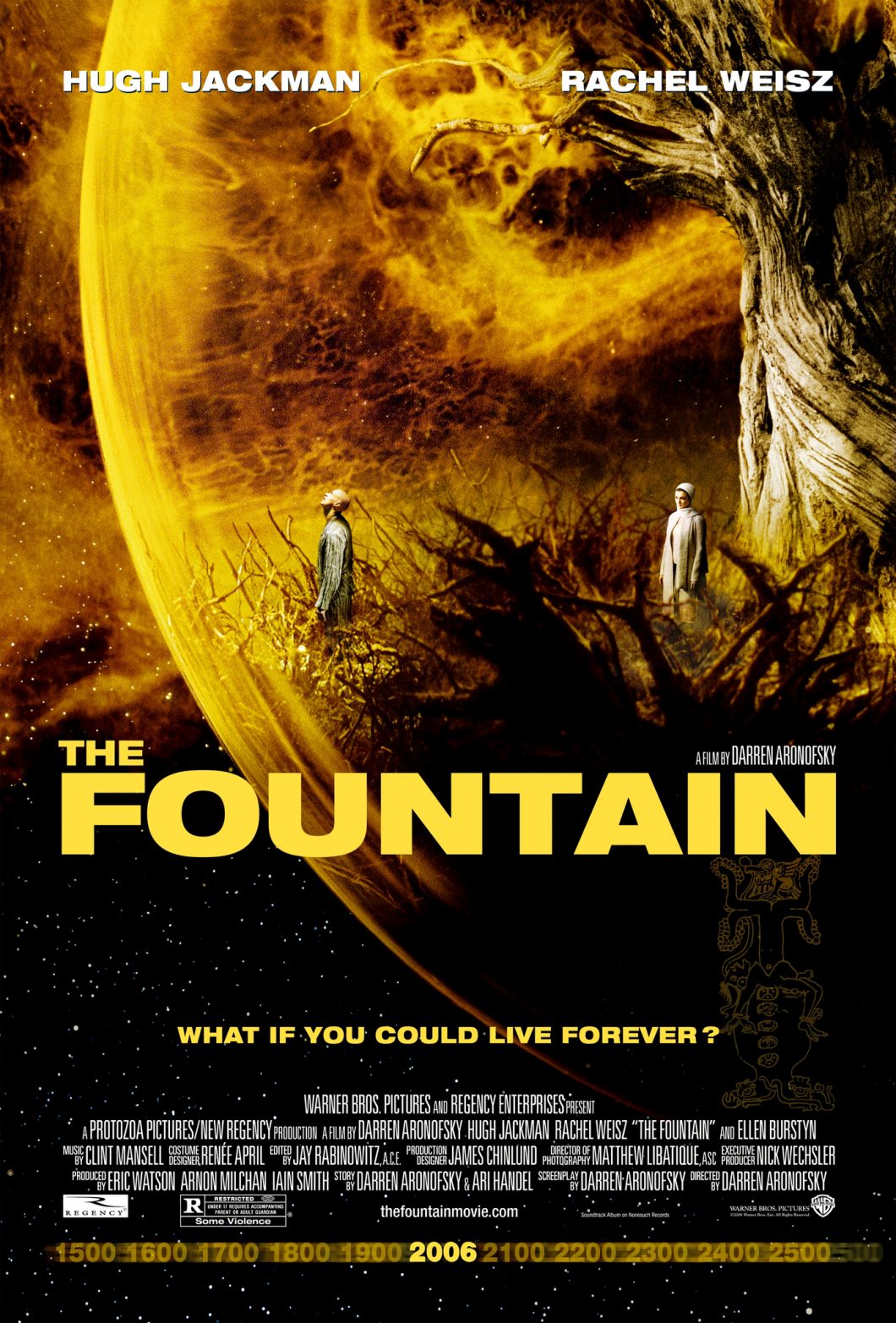Damn. Here we go again. Last summer, I loved the hell out of the almost universally despised Lady in the Water. Four months later, an even more extraordinarily heartfelt and visionary picture is being released and, you guessed it, most other critics still don’t get it. Now, I don’t wanna sound smug and be all like, everyone’s an idiot except me. But here’s the thing: EVERYONE’S AN IDIOT EXCEPT ME! Okay, I take that back, hold the hate mail. I mean, I can see why some might not necessarily be as moved as I was by this love story or not be willing to take the wild leaps of faith that the multithreaded narrative demands. What I simply cannot conceive is how you could be deaf, dumb and blind enough to dismiss the obvious genius of Darren Aronofsky‘s direction, Matthew Libatique‘s cinematography, Jay Rabinowitz‘s editing, Clint Mansell‘s score (performed by Mogwai and the Kronos Quartet) and Hugh Jackman‘s acting, even if you feel that it’s all in service of a ridiculous screenplay.
“The Fountain” is a film at once incredibly dense and disconcertingly simple, utterly over the top and sincerely down to earth, profoundly saddening and defiantly hopeful. It’s a pure work of art that’s all about contradictions, both thematically and in the way it refuses to position itself clearly in any genre or filmmaking current. Maybe that’s why so many critics can’t handle it, because it can’t be reduced into a little catchy blurb (“It’s Die Hard on a boat!”). Experimental cinema and sentimentality are usually mutually exclusive, and people often like one at the expense of the other. Personally, I’m able to appreciate experimental flicks even if they leave me cold and, while I’m a sucker for overflowing emotion, I can readily acknowledge that a lot of melodramas aren’t great filmmaking. Which brings us to why “The Fountain” is the movie I’ve loved the most in years: it’s the rare picture that’s the best of both worlds.
If you put a crossbow to my head and did force me to come up with one of those little catchy blurbs we critics seem to love so much, I’d say that this is like “2001” if Kubrick actually gave a shit about the human characters. Or on the flipside, like a Paul Thomas Anderson film on peyote! Some sequences are nearly abstract, leaving you in astonishment, mouth agape, taking in the exquisite beauty of the filmmaking, others put you smack down into the characters’ emotional state, and then there are many that inspire both reactions simultaneously. In any case, it’s bliss.
This is the kind of film where I’d almost rather not even bother with a plot summary, preferring to let you experience it for yourself, but I’ve heard so many other reviewers call it incomprehensible that I have to show you how easy to understand it actually is. Much has been said about how the film jumps back and forth through time over a 1000-year span, with the same two actors (Jackman and Rachel Weisz) playing three different sets of characters. Sounds confusing, but it really isn’t that much. The central storyline is the contemporary one, in which a doctor is desperately trying to find a cure for cancer to save the life of his wife, who’s dying of a brain tumor. Meanwhile, inspired by her research on Mayan creation and afterlife myths, she’s writing a book about a conquistador sent by the Queen of Spain on a quest to the New World to find the Tree of Life. Which leaves the space yoga stuff, where a lone soul travels through the universe towards a mysterious nebula, which is admittedly more difficult to rationalize but does work splendidly symbolically. Basically, it’s all about the frustrating fact that everyone you ever love (including youself!) will eventually die and the many ways mankind has attempted to deal with it mystically, scientifically or spiritually.
So it’s about death, but it’s also about love, one of the ways in which we mortals can reach immortality; you could die today, but you’ll always be alive in the hearts of the people that loved you. “Together we shall live forever.” To convey this, Aronofsky couldn’t have cast a better twosome (sorry Brad and Cate) than his own wife, Rachel Weisz, and the ever more impressive Hugh Jackman. Alternately mischievous and heartbreaking, Weisz is intensely lovable from her first to her last moment on screen. And in the more complex and challenging part, Jackman proves once and for all that he’s one of the best actors in cinema today, equally capable of being a romantic lead à la Cary Grant and an obsessed conquerer à la Klaus Kinski.
Equal parts historical epic, futuristic fantasy and intimate drama, “The Fountain” is an endlessly rewarding watch, as visually hypnotic as it is emotionally wrenching. And I’m sure this is only the beginning: multiple viewings will undoubtedly see this story keep growing and opening up in all kinds of ways, as all masterpieces do. I can’t guarantee that if you go see it this week-end you’ll be as blown away as I was. But I’m certain to my core that decades from now, this is one of the pictures people will still be talking about.

